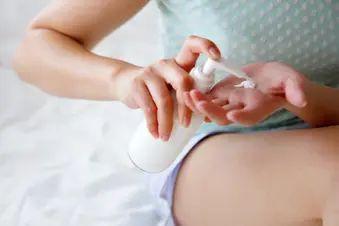
By Lenora Claire, as told to Kara Mayer Robinson
I was diagnosed with psoriasis when I was 13 and red spots appeared on my elbows and knees. It was mild until my early 20s, when it was upgraded to moderate to severe.
Over the years, my dermatologist has worked with me to find the right treatment and medication. It’s been a process.
My Search for the Right Treatment
Finding the right treatment is so important.
I tried every topical treatment (the kind you apply to your skin) under the sun, from smelly tar ointments to newer topicals, with little success. Light therapy (phototherapy) provided zero results. Steroid injections flattened my lesions, but they didn’t fully go away. Methotrexate only gave me side effects of hair loss and nausea. I was on a low dose, but I found it most unpleasant.
For me, biologic drugs made all the difference. I’ve been completely clear for long stretches of time. I started with one type, and now I use a different one.
As soon as biologics came out, I marched into my dermatologist’s office and declared I was ready. Back then, biologics were prohibitively expensive. But I was able to join a clinical trial for one of these drugs. In about 3 months, I was clear for the first time in my adult life. I’m thrilled that my insurance makes the biologic I use now accessible.
I could’ve saved a lot of tears in my early 20s if I knew biologics were around the corner. They’ve completely changed the quality of my life.
When I was younger, I was always covered up because I was ashamed of my skin. I even quit modeling. But now I’m clear. I wish I wasn’t so hard on myself and could get those years back. I also wish I didn’t spend so much money on quack beauty products. But I was willing to try anything.
Know Your Triggers
It’s helpful to know what triggers your psoriasis flare-ups. Stress and alcohol are my biggest triggers.
When I turned 21, both my social life and my psoriasis erupted. The introduction of liquor seems to be the link, but I didn’t see the connection right away.
My dermatologist had me journal everything I was eating and drinking. That helped us figure it out. I wasn’t drinking every day, but I would notice new red patches showing up after tequila-soaked weekends.
I’ve completely avoided alcohol for a decade. But unfortunately, it’s impossible to avoid stress.
While everyone has some level of stress in their life, I’ve been stalked by a stranger for over a decade. Unfortunately for crime victims, there can be a lot of collateral damage in the way of health. There’s absolutely a connection between my stress and my skin.
I’ve been in therapy on and off for years. As a victims' advocate, I’ve also found being involved in the survivor community is a great way to work through trauma and begin healing internally and externally.
I lead a free yoga class for crime survivors every week. I take walks with my dog every day. I also try to make healthy choices to keep my stress as low as possible.
Lifestyle Choices Matter
Good lifestyle choices help. I see a huge difference when I abstain from alcohol, stick to a clean diet, and follow a regular exercise program.
A healthy diet. I try to avoid fatty, greasy, and salty foods. But I live in LA, so tacos still happen. I notice that nightshade vegetables, specifically tomatoes, aren’t great for me. I try to eat foods high in protein that aren’t heavily processed.
Regular exercise. I have a miniature pinscher, which helps me get in 3-5 miles of walking every day. I also do weekly yoga, plus occasional hikes when the weather permits.
The right medication. For me, diet and exercise alone aren’t enough to be clear, but they help keep my psoriasis manageable. I take my biologic every month. I use topicals when necessary, which is rare.
A gentle approach. Every day I apply a gentle moisturizing lotion. And as much as I love hot showers, I have to stick to moderate temperatures because heat can worsen my psoriasis.
My Top Tips for Managing Psoriasis
I’ve tried a lot of things over the years. Here are a few tips I’ve learned.
Avoid scrubbing. As tempted as you might be to scrub or use a loofah, don’t do it. It doesn’t help and can make your psoriasis worse.
Find a good dermatologist. I feel like finding a good doctor is similar to dating. You don’t have to marry the first one you meet. If your doctor isn’t listening to your needs, find one who will.
Follow your doctor’s advice. It goes both ways. I always follow my doctor’s instructions and remain open to their suggestions.
Be your own advocate. I’m also a huge advocate for myself. I’m active in psoriasis groups on Facebook and I’m always reading about new options and treatments.
Keep trying. We’re all different, so what worked for others may not work for you. Similarly, what didn’t help them may help you. Try everything until you get the right combo. It’s possible to improve your psoriasis and to be clear. Don’t give up.
Show Sources
Photo Credit: BloomImage RF / Getty Images
SOURCE:
Lenora Claire, 41, casting producer and victims' advocate, Los Angeles.